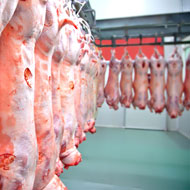
FSA approves Welsh abattoir to slaughter without pre-stunning, BVA confirms
An abattoir in Wales has been approved to carry out non-stun slaughter, the BVA has revealed.
This week, Rebecca Evans, the Welsh deputy minister for farming and food, wrote to the BVA to confirm the Food Standards Agency (FSA) has approved Cig Menai Cymru, an abattoir in Caernarfon, to carry out slaughter without pre-stunning - a practice the BVA is campaigning to ban.
Ms Evans said the Welsh Government is "in dialogue with a private company regarding job creation at an abattoir in Caernarfon".
BVA has accused the Welsh Government of failing to answer questions about the abattoir and being 'out of touch' with the public.
The veterinary association said it is "concerned that the Welsh Government is considering using public money to support the company without prioritising animals’ welfare and the damage done to the image and reputation of the Welsh meat industry if they knowingly support a company that doesn’t stun before killing."
Rob Davies, president of the BVA Welsh branch, said: "I would appeal to Welsh farmers to consider the damage done to the image and reputation of Welsh meat if they knowingly take or send animals to an abattoir which doesn’t stun before killing, whether a local abattoir or a distant one. Welsh meat must be welfare friendly from birth to slaughter."
Under EU and UK law, all animals must be stunned before slaughter to render them insensible to pain, but an exemption in the law allows this practice in certain religious communities.
The Welsh Government is said to have failed to answer questions about the species or throughput in the abattoir. BVA says without this information it is impossible to properly assess how much of the meat is being used for religious practice and how much is entering the general food chain.
In addition, the BVA says it asked the government how it will ensure that meat derived from animals that were not pre-stunned, only goes to the religious communities to which the legal exemption applies. According to the BVA, this question was ignored.
Rob Davies, president of the BVA Welsh branch, said: "BVA calls upon the Welsh Government to state clearly that it will not spend public money on abattoirs which don’t stun animals before killing them, either now or at any time in the future."
A Welsh Government spokesperson said: "The welfare of animals is a priority for the Welsh Government, as demonstrated by our Animal Health and Welfare Framework which was introduced by the Deputy Minister for Farming and Food in July 2014.
"We have implemented EC Regulation 1099/2009 on protection of animals at time of killing."
An e-petition by the BVA campaigning for a ban on non-stun slaughter has now reached more than 96,000 signatures.
Article changed on 23.01.15 at the request of the Welsh Government to include a statement from a spokesperson and to clarify that the FSA, not the Welsh Government, approved Cig Menai Cymru to carry out non-stun slaughter.



 HMRC has invited feedback to its communications regarding the employment status of locum vets and vet nurses.
HMRC has invited feedback to its communications regarding the employment status of locum vets and vet nurses.